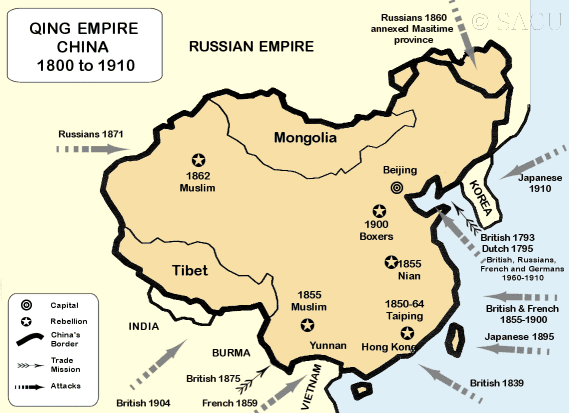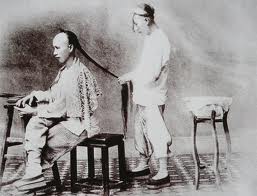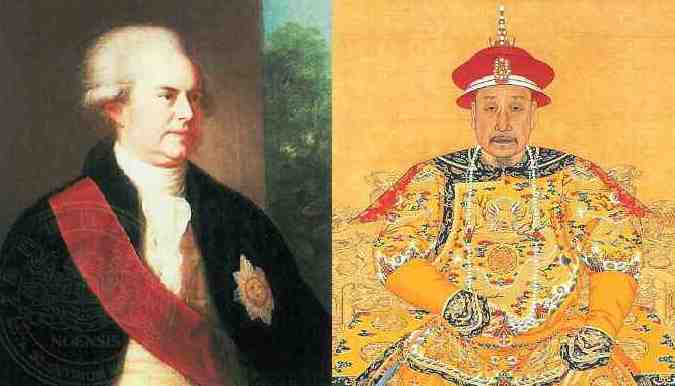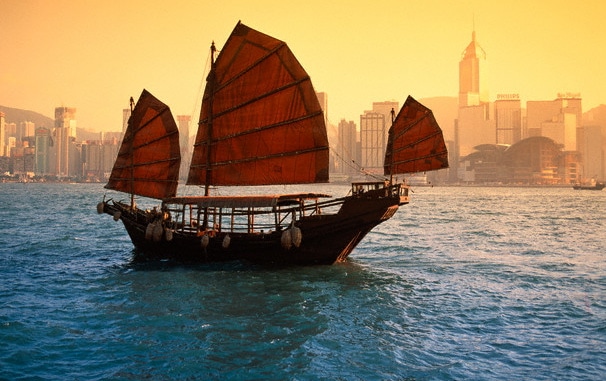The Manchus contend that the Ming had lost the Mandate of Heaven, and declare a new dynasty, the QING (“pure” or “clear”). China is again ruled by non-Chinese foreigners, this time the northern Manchurians, who would stay in power for another two and a half centuries. For first 150 years—unchecked by foreign aggression—the Qing enjoyed a long period of peace and stability.
MAINTAINING A SEPARATE MANCHU IDENTITY
The Manchus set up dual-track official system with important posts reserved only for ethnic Manchus. They also established special troops — called “Banner Forces” — composed of only Manchu soldiers.
They set themselves apart culturally from Chinese in many ways—for example, their women didn’t practice foot-binding (which started in the 10th century). Also, Manchu language study was mandatory (as Mandarin is in modern day China) and restrictions were established on intermarriage with the Chinese.
Most famously, they forced Chinese men to wear queues (head shaven with a long braid). They enforced this with the death penalty (which has a long, rich tradition in China). A popular saying of the time: “Keep your hair and lose your head. Or lose your hair and keep your head.”
By the end of the 1700s, Manchu power weakened considerably– from problems ranging from corruption to military inefficiency to population growth. At the same time, anti-Manchu sentiment continues to heat up.
1800-1842: THE DECLINE OF THE QING
1800: The population swells to around 300 million.
The 19th century was one of China’s most turbulent periods—rocked by internal uprisings, natural disasters, and the relentless encroachment of the west. But unlike the meltdown of previous dynasties, something more fundamental was happening—the meltdown of the imperial system itself.
At the end of the 18th century, rebellions started breaking out—most notably the White Lotus Rebellion, which took the weakened Qing nine years to suppress. Starting from the 1790’s, the wheels started coming off—the Qing fell into a slow death spiral from which they’d never recover.
THE RISE OF THE WEST
Slowly but surely, the balance of power started shifting away from China—increasingly weakened by internal dissent—and towards the West.
Walled off from the rest of the world, China was insulated from pivotal developments in Europe–namely, the Scientific and Industrial Revolutions (18th and 19th centuries). Europe’s superior sea power and military technology slowly tipped the balance in their favor during the 1800s. Ironically, European powers would use some of China’s own inventions to dominate China (such as the magnetic compass as well as gunpowder and cannons).
But the Qing didn’t see it coming. They would have to learn the hard way. China’s process of adaptation to a modern world dominated by Western ideas continues to this day.
EARLY TRADE WITH THE WEST
In the early 1800s, China had limited contact and trade with Westerners. The Qing were arrogant towards the West. They believed that China was a self-sufficient empire and that the West had nothing of great value to offer. And it was mostly true: During the early part of the century, the trade balance was very much in China’s favor (Lots of silver coming in. Lots of tea, silk, porcelain going out).
CAFFEINE ADDICTION
Before long, the British were addicted to tea. In 1700, Europe imported a tiny amount. By 1800, it became a national habit in England, which was importing 23 million pounds a year. During that time, the import duty of Chinese tea provided the British government with one-tenth of its total revenue.
TRADE TENSIONS BUILD…
Europe wanted increased access to the Chinese market but the Manchu court continued to limit foreign traders in the port of Canton (today’s Guangzhou near Hong Kong), under the Canton System (partly because they were worried that they would join forces with the Chinese).
[ Click here for more on early Western trade with China, the Canton System, and birth of Hong Kong ]
Frustration built until the British sent Lord Macartney to establish diplomatic relations with the Qing rulers in 1792. By this time, Britain was a great power with a massive navy. However, this was news to the Qing, who still regarded all Western barbarians as lesser powers—certainly not equals.
Lord Macartney famously refused to kowtow (kneeling and touching forehead to ground) to the Qing emperor and he was refused a meeting. It was not a good start. Fifty years later it would be war.
NEXT: An alternative to tea >>





![The Ming Dynasty [1368-1644 ]](https://www.china-mike.com/wp-content/uploads/2011/01/ming-dynasty-map-small.jpg)
